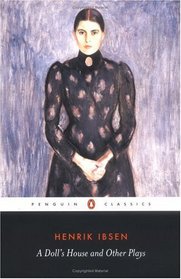"One of the earliest writers to dramatize the individual's alienation from society."
A review from Amazon.com:
In this interesting play, Henrik Ibsen sets up a scenario of a married couple with three children that seem to have a good relationship with each other. This couple is Nora and Helmer (called Torvald by Nora). They always seem to have romantic conversations with each other, but soon, we learn that years ago Nora had to take a loan from Nils Krogstad, in order to pay off a lifesaving medical treatment for Helmer. He doesn't know this and thinks that the money came from Nora's father, who has passed away.
Helmer, who has just been named a manager of a bank, is always treating Nora in such a sweet manner, such as "Is that my little lark twittering out there?" or calls by another bird's name. She always gets little money from Helmer, but never gets large sums because Helmer is worried he thinks she doesn't know how to manage her money wisely. In the beginning, Nora treats Helmer with overwhelming respect although Nora is hiding her loan that she is paying off on a regulaly with some of the money from Helmer. Nora doesn't want Helmer to think she took a loan since she thinks it could affect their relationship.
There are three other supporting characters in this play: Dr. Rank, Nils Krogstad, and Christine Linde. Dr. Rank is a friend of the family who is seriously ill. Nils Krogstad a worker at the bank, who is about to his job to a friend of Nora's, Christine Linde, a woman who recently moved back to the area because her husband died.
At the end of Act II, we find out Nora forged her father's signature on the loan. Krogstad had written a letter to tell Helmer about the loan. Nora is worried that Helmer will read the letter Krogstad wrote.
This play is about a woman trying to understand her marriage, and always wanting something wonderful to happen. With Helmer, she finally realizes that she isn't being treated the way she wants, and nothing wonderful seems to happen. Nora had no trouble making the decision of leaving her family, but perhaps she would have had a hard time recovering from this rare type of circumstance in this time and age.
In this interesting play, Henrik Ibsen sets up a scenario of a married couple with three children that seem to have a good relationship with each other. This couple is Nora and Helmer (called Torvald by Nora). They always seem to have romantic conversations with each other, but soon, we learn that years ago Nora had to take a loan from Nils Krogstad, in order to pay off a lifesaving medical treatment for Helmer. He doesn't know this and thinks that the money came from Nora's father, who has passed away.
Helmer, who has just been named a manager of a bank, is always treating Nora in such a sweet manner, such as "Is that my little lark twittering out there?" or calls by another bird's name. She always gets little money from Helmer, but never gets large sums because Helmer is worried he thinks she doesn't know how to manage her money wisely. In the beginning, Nora treats Helmer with overwhelming respect although Nora is hiding her loan that she is paying off on a regulaly with some of the money from Helmer. Nora doesn't want Helmer to think she took a loan since she thinks it could affect their relationship.
There are three other supporting characters in this play: Dr. Rank, Nils Krogstad, and Christine Linde. Dr. Rank is a friend of the family who is seriously ill. Nils Krogstad a worker at the bank, who is about to his job to a friend of Nora's, Christine Linde, a woman who recently moved back to the area because her husband died.
At the end of Act II, we find out Nora forged her father's signature on the loan. Krogstad had written a letter to tell Helmer about the loan. Nora is worried that Helmer will read the letter Krogstad wrote.
This play is about a woman trying to understand her marriage, and always wanting something wonderful to happen. With Helmer, she finally realizes that she isn't being treated the way she wants, and nothing wonderful seems to happen. Nora had no trouble making the decision of leaving her family, but perhaps she would have had a hard time recovering from this rare type of circumstance in this time and age.




